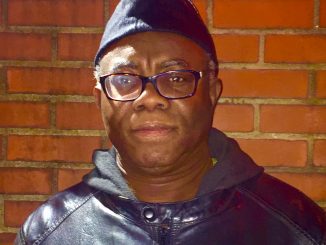
I found Mr. Kenneth Afriyie Appiah’s article titled “Dr. Bawumia; Don’t Let Saudi Arabia Fish for You, Learn How They Fish” (Modernghana.com 8/13/19), to be quite fascinating and instructive, although I think the filmic theme on which he claimed his article to have been based to be a little off. Very likely the Nollywood movie was based on the Chinese maxim, commonly quoted globally, that goes as follows: “Give a man a fish and you feed him for a day; but teach a man how to fish and you feed him for many days,” if not forever.
The foregoing analogy, which is based on the recent announcement by Vice-President Mahamudu Bawumia on the promise by King Salman Bin Abdulaziz, of Saudi Arabia, to construct a Medical University, not a “medical facility,” by the way, in Northern Ghana, as well as some 42 state-of-the-art Senior High Schools around the country, was also a bit off. To be certain, investing in the substantive medical training of talented Ghanaian youths and our high school-going children and grandchildren could not be savvier and more constructive.
And so, if anything at all, Mr. Afriyie Appiah rather ought to be commending and congratulating Ghana’s Vice-President for having so wisely managed to convince King Abdulaziz Al-Saud to invest in the long-term sociocultural development of the Sovereign Democratic Republic of Ghana. I have already written another article titled “The Saudi Gift Horse,” in which I strongly express my misgivings, largely having to do with ideology, so I do not intend to veer off into a lengthy discussion of the same.
You see, while I sincerely believe in the learning of foreign languages and cultures, especially such long-established and seminal languages and cultures as Arabic and Islamic Civilization, as well, nevertheless, I am also equally of the firm and uncompromising view that primacy and incontestable priority ought to be afforded the development of our indigenous languages and cultures. Which was why a little over a year ago, or thereabouts, I was one of those active media practitioners who fiercely fought off what we then deemed to be the sly and pernicious attempt to erase the healthy growth and development of our indigenous cultures and languages.
Back then, Vice-President Bawumia had announced at a gathering with leaders of the Muslim community that the Akufo-Addo-led government of the New Patriotic Party (NPP) intended to recruit some 3,000 Arab-language and Islamic scholars to teach in schools in the predominantly Muslim parts of the country. That has been my concern and continues to be my concern to this day. But what I also wanted to highlight here is that nauseatingly facile tendency of many Ghanaian political pundits to auto-knee-jerkily make patently incongruous comparisons between Ghana and such relatively more advanced Asian countries as Singapore, Indonesia, Malaysia and, in the case of Mr. Afriyie Appiah, South Korea.
Indeed, had he been studiously following the history of the Korean Peninsula, Mr. Afriyie Appiah would have since long appreciated the fact that the economic and industrial giants of the West, especially the United States and Britain, but the European Community, in general, has a kind of deep-seated or abiding strategic interests in that part of the world that these prime engines of socioeconomic and industrial development absolutely do not seem to have for thoroughgoing corruption-wracked former colonies like Ghana. Indeed, if he had been paying studious attention to South Korea’s political culture, the pontifical and understandably deeply frustrated critic would have also noticed that the generous tolerance with which Ghanaian politicians clearly seem to envisage clinical kleptocrats like Messrs. Alfred Agbesi Woyome and Mahama Ayariga and, of course, former President John Dramani Mahama, is decidedly nonexistent in South Korea, where not very long ago, for instance, a former President was indicted on corruption charges, vigorously prosecuted and promptly sentenced to a considerable term of imprisonment.
In Ghana, on the other hand, it well appears that the best friend of our most prominent politicians is rank corruption. Indeed, it has often been said that if you are a big-time politician in Ghana, these days, and your hands are not deeply mired in corruption or kleptocratic scams, you must be either suffering from a bout of acute dementia or you are simply a clinical idiot. In short, stealing from our National Treasury well appears to have been deeply wired into our genes or DNA makeup. I also perfectly agree with Mr. Afriyie Appiah that our leaders may be ages behind the routine striking of progressive contractual agreements for the critical and salutary development of our country.
But, of course, the incontrovertible and inescapable fact of the matter is that the global political and socioeconomic order is thoroughly rigged up against the prosperity of many a Third-World country, and especially African countries than Mr. Afriyie Appiah may be either willing or able to critically and intellectually examine and fully appreciate. You see, it is very easy for the critic to smugly bandy about such mellifluous transactional terms as “Service Contracts,” as opposed to the obsolescently primitive colonialist and neocolonialist ways of going about the same. But it goes with saying that Mr. Afriyie Appiah would be making an egregious mistake to so facilely underestimate the staying power of racism and the burden of race and history in the global reckoning and balance of power.
We may be far more of victims of our history and sociopolitical circumstances than either merely being intellectually and or psychologically too unsophisticated, or even too culturally benighted to fully appreciate the way that savvy and more progressive contractual agreements are crafted and ratified, the seemingly fervid support and encouragement of progressive white liberal scholars and technocrats notwithstanding.
*Visit my blog at: kwameokoampaahoofe.wordpress.com Ghanaffairs
The views expressed by this author remain solely their own and are not to be taken as the view of the Editorial Board of www.africanewsanalysis.com
